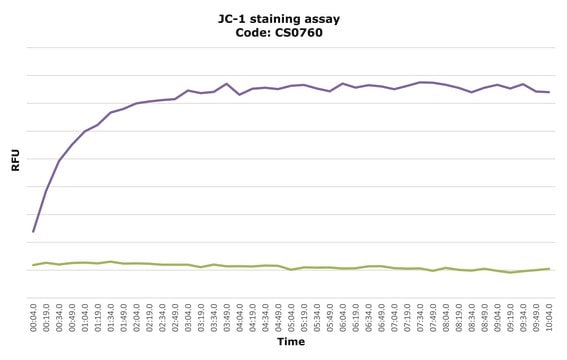CYTOCOX1
Cytochrome c Oxidase Assay Kit
sufficient for 100 tests, soluble and membrane bound mitochondria
Synonym(s):
Cytochrome c Oxidase Activity Assay Kit
Sign Into View Organizational & Contract Pricing
All Photos(1)
About This Item
UNSPSC Code:
12161503
NACRES:
NA.84
Recommended Products
Quality Level
usage
sufficient for 100 tests
shipped in
dry ice
storage temp.
−20°C
Gene Information
human ... COX1(4512)
Application
The Cytochrome c Oxidase Assay Kit uses an optimized colorimetric assay based on observation of the decrease in absorbance of ferrocytochrome c measured at 550 nm, which is caused by its oxidation to ferricytochrome c by cytochrome c oxidase. This kit is suitable for the detection of mitochondrial outer membrane integrity/mitochondrial stress and for the detection of mitochondria in subcellular fractions.
Biochem/physiol Actions
Cytochrome c oxidase [EC 1.9.3.1] is located on the inner mitochondrial membrane dividing the mitochondrial matrix from the intermembrane space, and has traditionally been used as a marker for this membrane. It is also located in the cytoplasmic membrane of bacteria. Cytochrome c oxidase provides energy for the cell by coupling electron transport through the cytochrome chain with the process of oxidative phosphorylation.
Features and Benefits
- Simple, optimized protocol - Obtain reproducible results without special training needs
- Useful for determining cytochrome c activity from any mitchondrial source - The enzyme is present in all mitochondria regardless of species
- Useful for detecting the presence of mitochondria in subcellular fraction - Save time and increase confidence in the quality of organelle preparations
- May be used in conjunction with the MITOISO1 Mitochondrial Isolation Kit - Standardized mitochondrial preparation and analysis ensures reproducibility
- Use to analyze the intactness of mitochondrial membranes
- Simple colorimetric measurement of solution
related product
Product No.
Description
Pricing
Signal Word
Danger
Hazard Statements
Precautionary Statements
Hazard Classifications
Eye Dam. 1 - Skin Irrit. 2
Storage Class Code
10 - Combustible liquids
Certificates of Analysis (COA)
Search for Certificates of Analysis (COA) by entering the products Lot/Batch Number. Lot and Batch Numbers can be found on a product’s label following the words ‘Lot’ or ‘Batch’.
Already Own This Product?
Find documentation for the products that you have recently purchased in the Document Library.
Customers Also Viewed
Filip J Larsen et al.
FASEB journal : official publication of the Federation of American Societies for Experimental Biology, 25(8), 2843-2852 (2011-05-18)
The basal metabolic rate (BMR) is referred to as the minimal rate of metabolism required to support basic body functions. It is well known that individual BMR varies greatly, even when correcting for body weight, fat content, and thyroid hormone
Hikaru Miyagi et al.
The Journal of biological chemistry, 284(12), 7553-7560 (2009-01-23)
Cells of the yeast Saccharomyces cerevisiae contain three NAD kinases; namely, cytosolic Utr1p, cytosolic Yef1p, and mitochondrial Pos5p. Previously, the NADH kinase reaction catalyzed by Pos5p, rather than the NAD kinase reaction followed by the NADP(+)-dependent dehydrogenase reaction, had been
Chao-Chin Liu et al.
Frontiers in microbiology, 11, 170-170 (2020-03-03)
Staphylococcus aureus spreads rapidly on the surface of soft agar medium. The spreading depends on the synthesis of biosurfactants, i.e., phenol soluble modulins (PSMs), which facilitate colony spreading of S. aureus. Our earlier study demonstrated that water accumulates in a
Filip J Larsen et al.
Cell metabolism, 13(2), 149-159 (2011-02-03)
Nitrate, an inorganic anion abundant in vegetables, is converted in vivo to bioactive nitrogen oxides including NO. We recently demonstrated that dietary nitrate reduces oxygen cost during physical exercise, but the mechanism remains unknown. In a double-blind crossover trial we
Céline Aguer et al.
PloS one, 6(12), e28536-e28536 (2011-12-24)
Human primary myotubes are highly glycolytic when cultured in high glucose medium rendering it difficult to study mitochondrial dysfunction. Galactose is known to enhance mitochondrial metabolism and could be an excellent model to study mitochondrial dysfunction in human primary myotubes.
Our team of scientists has experience in all areas of research including Life Science, Material Science, Chemical Synthesis, Chromatography, Analytical and many others.
Contact Technical Service






